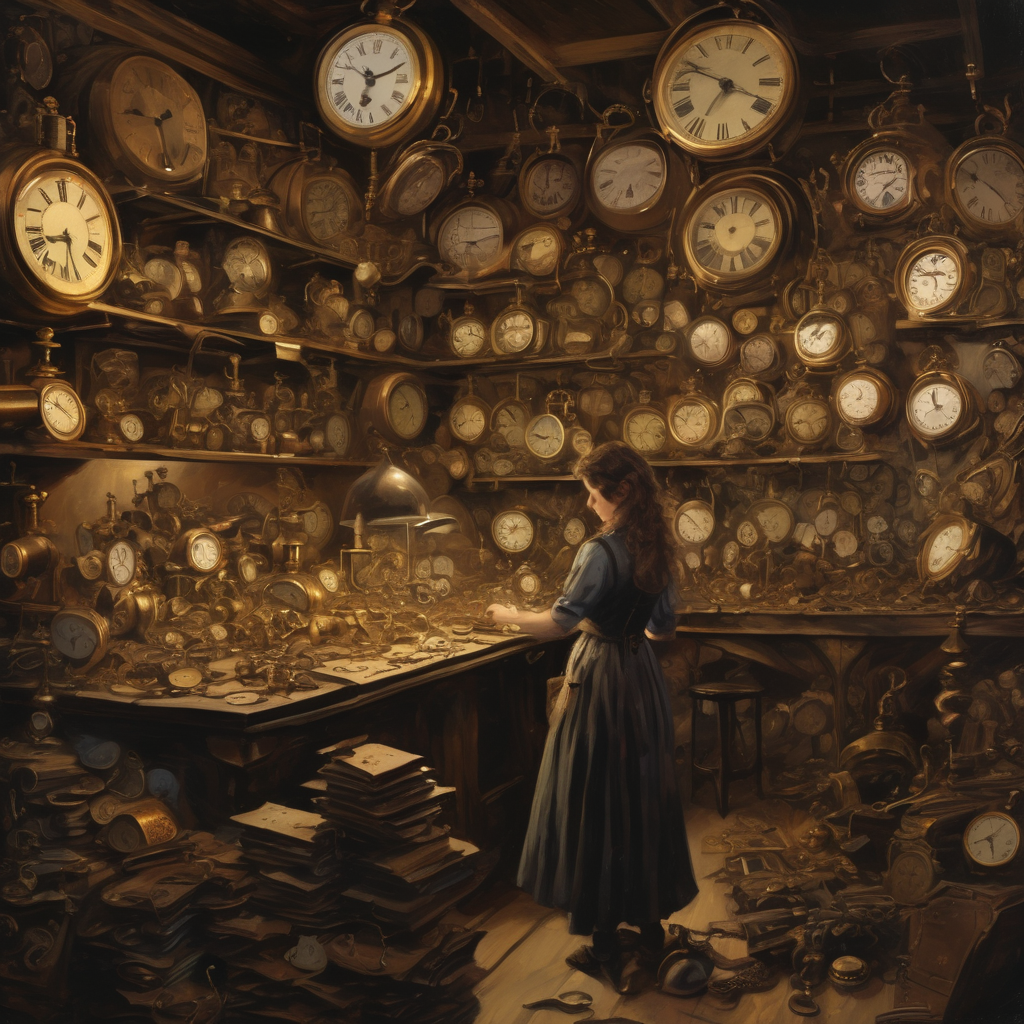The clockmaker’s daughter could taste time. Not metaphorically—she could run her tongue along the brass gears of her father’s creations and know exactly when they would stop ticking. Sweet meant decades; bitter meant days. The grand clock in the Parliament tower tasted of burnt sugar and sorrow, which is why she knew the minister would die before spring.
Her father had warned her about the gift before he disappeared into his workshop forever, becoming one with the infinite mechanisms he’d built. “Some people are born to measure time,” he’d said, oil staining his fingertips. “Others are born to eat it.”
The morning she met the man who forgot tomorrow, she was examining a pocket watch that tasted of cinnamon and rain. Its owner, a woman in a crimson blazer who claimed to be investigating sustainability initiatives for the crown, had left it for repair, but the watch wanted something else entirely. It wanted to run backward.
“Excuse me,” said a voice like October wind. “I’m looking for yesterday, but I keep finding next week.”
She looked up. The man standing in her shop wore a coat made of newspaper headlines that hadn’t been written yet. His eyes were the color of elections that hadn’t been held, and when he smiled, she glimpsed a void where his molars should be—tiny black holes that swallowed light and probability.
“You’re early,” she said, though she wasn’t sure for what.
“I’m always early. Or late. It’s hard to tell when you’ve forgotten which direction time moves.” He pulled out a ballot from his pocket—not a voting ballot, but something older, written in a language that predated words. “I was told you could help me remember tomorrow. I lost it somewhere between the climate conference and the revolution.”
She recognized him then, though they’d never met. He was in every photograph her father had hidden in the workshop walls—standing behind world leaders at treaties that would never be signed, casting shadows at protests that hadn’t happened yet. The man who forgot tomorrow had been traveling backward through history, and soon he would reach the beginning, where everything would unmake itself.
“The watches have been whispering about you,” she said, gesturing to the hundreds of timepieces lining her walls. They tick-tocked in languages both dead and unborn. “They say you’re looking for the moment between moments.”
“I’m looking for my daughter,” he corrected, and suddenly the shop grew cold. “She was supposed to be born tomorrow, but I forgot which tomorrow, and now she’s scattered across every possible future like seeds in a democratic wind.”
The clockmaker’s daughter understood. She pulled out her father’s final creation—a watch that had no hands, only a mirror where the face should be. When she looked into it, she saw herself as she would be in every potential timeline: a president in one, a refugee in another, a mother of three, a woman who never existed at all.
“Time isn’t linear for people like us,” she said. “Your daughter exists in the spaces between seconds. She’s in every skipped heartbeat, every held breath at a polling station, every moment when someone chooses to act instead of wait.”
The man who forgot tomorrow wept newspapers—headlines about wars that might be, peace treaties written in conditional tense. “How do I find her?”
“You don’t,” said the clockmaker’s daughter. “You become the moment she can exist in.”
She took his ballot—that strange document older than writing—and fed it to the watch with no hands. The shop filled with the sound of every clock striking thirteen, a time that didn’t exist but insisted on happening anyway. The walls began to dissolve, revealing the workshop where her father had become one with time itself, his consciousness spread across every gear and spring in creation.
“Choose,” she said, as reality folded like origami around them. “You can remember tomorrow and lose your daughter to certainty, or forget tomorrow and let her exist in possibility.”
The man who forgot tomorrow looked at the clockmaker’s daughter—really looked at her—and saw what she had always known. She tasted of cinnamon and rain, of burnt sugar and sorrow. She was the daughter scattered across time, the child of someone who had chosen to forget rather than confine her to a single future.
“You’re her,” he whispered.
“I’m everyone’s daughter who was never born,” she replied. “And you’re everyone’s father who chose possibility over certainty.”
He reached out to embrace her, but she was already dissolving into clock hands and referendum results, into sustainable futures and cancelled timelines. The last thing he saw was her smile—the same smile he would forget tomorrow, and discover again yesterday, in the shop where time went to be repaired.
The watches kept ticking in their hundred languages, and somewhere in the Parliament tower, a clock that tasted of burnt sugar struck an hour that would never come.

Leave a Reply